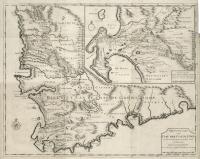
- First Nations People
This list highlights first nations people. Few first nations people, Khoe, San, etc., are currently included in the project. This will change when I have finished entering data from the church and other records of the period and move on to the journals, official correspondence, court records, etc.
With respect to the first nations people - Khoe and San (Bushmen) - in particular, it is important to bear in mind that everything we know about them in the first decades of the settlement at the Cape, comes from records (journals, letters, etc.) written by members of the settler population. We do not have the words, perspectives, or knowledge of these original people, except as quoted by the settlers who did not know their language, and who routinely commented on their lifestyle, customs and traditions as individuals who clearly saw themselves as superior. The settlers often wrote with disdain, suspicion and prejudice, and if the expected action did not materialise and confirm the suspicion/prejudice, this was frequently turned on its head, to show ill-intent on the part of the indigene(s). A complete picture never emerges. Intrepretation of these records is therefor always going to be constrained by this lack of balance.
There is also an increasingly vocal interest group who maintain that the settler population at the Cape were "there first" and that Africans arrived after them. This is clearly a nonsense as is born out by the 1726 map which showed the locations of the various First Nations people. If not African, then what were the Khoe and San? The same group also insists there are no modern survivors of the Khoe and San - which is just as much of a nonsense.
I have wrestled with how to respectfully identify these individuals, while simultaneously making it easy to find them in the project. Where I have been able to identify the distinct people to whom they were — apparently — born, such as the Goringhacona, the Cochoquas, etc., I have thusly identified them - for example, Krotoa of the Goringhaicona. If I have thus far been unable to their people, for now I am using the suffix ‘of the Khoe’. As far as I know, I do not yet have any San in the project.
Some of the distinct peoples thrown into the Khoe mix, were apparently not strictly Khoe, but for now I am focused on entering as many individuals and groups as possible without much data. Once I have done that I will return to the journals and other records, and add events and commentary to which they are connected in the record. Hopefull this will lead to expanding and refining the individual entries.
My thanks, as always, goes to Mansell Upham, who shared a great deal of information and thus allowed me to find individuals and groups in the record.
- Slaves, Exiles, Convicts and their families
This list highlights slaves, political exiles, convicts and their families and also illustrates mixed unions, formal and otherwise - the extent of which are underestimated by many people.
It is important to bear in mind that everything we know about them in the first decades of the settlement at the Cape, comes from records (journals, letters, etc.) written by members of the settler population. With rare exceptions, we do not have the contemporaneous words, perspectives, or knowledge of the slaves and political exiles, except as quoted by the settlers. A complete picture never emerges. Intrepretation of these records is therefor always going to be constrained by this lack of balance.
Many of the descendants of these individuals ramified in both the white and coloured communities in South Africa.
- List of Changes
Additions and changes made to individuals in this project in the past twenty-four months
- List of people needing further identification, verification, clarification, etc.
These are individuals whom I need to further identify, verify or clarify. The list is short at present, but it will become longer over time, until it once again becomes shorter. Any assistance with these individuals will be greatly appreciated.